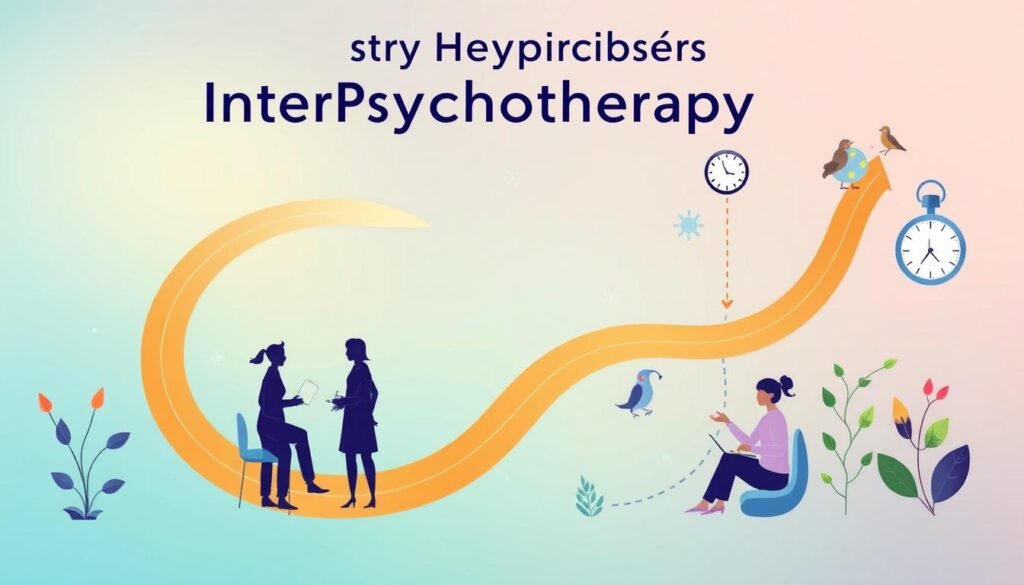Did you know that about 18.5% of adults in the U.S. face mental illness? Major depressive disorder is a common one among them. This fact highlights the need for effective treatments such as Interpersonal Therapy (IPT). With a focus on relationships and communication, IPT is tailored to tackle emotional distress. It offers a short-term, evidence-backed solution. Patients often see mood improvements within 12 to 16 sessions.
For effective depression management, building communication skills is key. These skills strengthen the bond between therapist and client, and encourage sharing feelings. Improved communication lets individuals handle their relationships better, enhancing their overall health. IPT helps people of all ages, from teens to seniors, to better deal with depression. This piece sheds light on how IPT uses communication to boost therapy results. To dive deeper, click here for foundational research on these methods.
Key Takeaways
- Interpersonal Therapy (IPT) is primarily used for treating major depressive disorder.
- IPT typically consists of 12 to 16 structured sessions, improving interpersonal relationships and mood.
- Effective communication skills enhance the therapeutic alliance and emotional expression.
- IPT strategies are critical in addressing interpersonal issues related to life’s stresses.
- Research supports IPT’s efficacy, showing comparable results to medication in some cases.
Introduction to Interpersonal Psychotherapy (IPT)
Interpersonal Psychotherapy, known as IPT, is a short-term, structured therapy. It focuses on improving relationships to help with mental health issues, especially depression. The idea is that better relationships can make us feel happier. IPT helps people express their feelings better and strengthens supports from friends and family.
The therapy lasts between 12 to 20 sessions over 3 to 5 months. It can be done in individual or group formats. This makes IPT flexible for different people, like teens and older adults. To see if IPT is right, therapists look at a person’s motivation, their support system, and if they can talk about their relationship issues well.
Early sessions of IPT focus on finding issues that contribute to depression. This might include dealing with loss, arguments, or major changes in life. During later sessions, therapists help individuals work through these issues. They also help improve how the person gets along with others. Besides depression, IPT is useful for treating anxiety and eating disorders too.
IPT teaches how to express emotions and communicate better in relationships. It helps people say what they need and how they feel to others. By solving current problems in relationships, IPT leads to better mental health and stronger connections with people.
Understanding Depression and Its Impact
Depression is a serious mental health issue. It changes how you live and connect with others. It’s marked by ongoing sadness, lack of interest in once-loved activities, and feelings of emptiness. These symptoms can really affect a person’s day-to-day life. Many find it hard to keep up with work or relationships because of depression.
Several factors can trigger depression, like stress, loss, or troubles with people. This situation often becomes a vicious cycle. Emotional distress worsens relationship issues, pushing the need to understand this dynamic more. Knowing how vital relationships are in managing depression, some therapies, like Interpersonal Psychotherapy (IPT), aim to fix these problems.
In IPT, therapists help their patients improve how they interact with others. This therapy usually takes 12 to 16 weeks, focusing on dealing with grief, role changes, and arguments. Through IPT, individuals find new ways to form and keep healthy relationships, which helps lessen depression.
It’s crucial for those suffering from depression to recognize its impact on their interactions with others. Therapies like IPT offer insights and tools to combat depression’s effects on everyday life. For details on the benefits of IPT, check out Interpersonal Therapy.
Importance of Communication Skills in Therapy
Effective communication skills are key in therapy. They play a big role in making the therapy journey successful. In Interpersonal Psychotherapy (IPT), these skills make therapy more effective and help patients get more involved. Therapists help clients speak about their feelings and thoughts. This helps in understanding emotions and the social issues causing depression.
Good communication skills help form strong bonds with therapists. This creates a place where it’s okay to be open. Feeling safe to share helps therapy work better. It makes patients more ready to talk about what’s bothering them. This is important for healing.
When clients feel they can talk openly, it’s easier to find and talk about social problems. Communication helps in understanding complex feelings. It also shows how important friends and community are. Through building these connections, patients find lasting support. This support is key in getting better. For tips on building a support network, check this guide.
Here is a table summarizing the vital role of communication in IPT:
| Aspect | Impact on Therapy |
|---|---|
| Encourages Self-Expression | Aids emotional processing, enhances understanding of feelings |
| Builds Trust | Cultivates a safe environment for sharing |
| Identifies Interpersonal Challenges | Facilitates focused discussions on conflicts and transitions |
| Enhances Social Support | Strengthens relationships, boosting recovery efforts |

Key Principles of Interpersonal Psychotherapy
Interpersonal Psychotherapy (IPT) is built on key ideas to tackle interpersonal problems linked to depression. It’s a short-term treatment that lasts between 12 to 16 weeks. The therapy is split into beginning, middle, and end phases. These phases help guide the therapy journey for both therapists and clients.
IPT focuses greatly on the impact of interpersonal relationships on mental health. Therapists work to improve clients’ understanding of how their relationships affect their depression. This process identifies key interpersonal issues such as grief, disputes in roles, changes in roles, and interpersonal deficits. Addressing these issues provides a clear path to tackle each client’s unique challenges.
The therapy uses techniques to build better social support and lower stress from relationships. Clients work together with their therapists, engaging in regular check-ups and homework. This approach helps clients develop and use effective communication skills. These skills are essential for managing their relationships and emotional well-being.
Studies show that IPT works well for various groups, including those with medical conditions, expectant mothers, teens, and the elderly fighting depression. It performs as well as other treatments like imipramine for major depressive disorder (MDD). It even does better than placebo in more severe cases. IPT can be adjusted to meet the specific needs of clients. This makes it a good choice for tackling a wide range of mental health issues, such as anxiety and eating disorders.

| Key Principles of IPT | Description | Target Areas |
|---|---|---|
| Time-limited Treatment | Structured therapy lasting 12-16 weeks | Depression, Anxiety Disorders |
| Focus on Interpersonal Relationships | Recognizes relational impacts on mental health | Grief, Role Disputes |
| Evaluation & Homework | Regular assessments and practical tasks | Emotional Awareness, Communication Skills |
| Efficacy Across Populations | Effective for diverse groups including adolescents and the elderly | Major Depression, PTSD, Eating Disorders |
Developing Communication Skills in IPT to Manage Depression
Interpersonal Psychotherapy (IPT) teaches important communication skills to handle depression. It creates a supportive space with the therapist’s help. This lets patients share their feelings freely.
Expressing feelings is key for better relationships. It also helps improve mental health.
Role of Therapeutic Alliance
At therapy’s core is the therapeutic alliance. It’s a close connection between therapist and patient. This special bond is based on trust and openness.
Such a relationship helps patients talk openly. They can discover deep emotions. This leads to stronger bonds with others.
Effective Emotional Expressions
Learning to express emotions helps patients talk about hard or confusing feelings. Therapists provide a safe space for this. Patients can then share their feelings more easily.
This support helps lessen depression’s impact. It boosts emotional health too.

| Aspect | Therapeutic Alliance | Emotional Expression |
|---|---|---|
| Definition | Collaborative relationship between therapist and patient | Conveying feelings and emotions in therapy |
| Importance | Fosters trust and openness | Reduces feelings of isolation |
| Outcome | Enhances engagement in therapy | Improves emotional well-being |
| Methods | Active listening, supportive feedback | Role-playing, emotional exploration |
Active Listening Techniques in IPT
Active listening is a key part of interpersonal psychotherapy (IPT). It takes the therapy experience to a higher level. Therapists don’t just hear words; they understand the feelings and thoughts behind them. This approach helps them support their patients better and makes the patients more involved.
Benefits of Active Listening
Active listening does more than improve how we talk with each other. It makes patients feel seen and respected. Some major benefits include:
- Enhanced understanding: Therapists learn more about what their patients are feeling.
- Encouragement of open dialogue: Patients are comfortable sharing their feelings and thoughts.
- Strengthened therapeutic alliance: Good listening helps build a strong, trusting relationship.
- Empowerment: When patients are listened to, they feel more confident.
How Active Listening Enhances Patient Engagement
Active listening is vital for getting patients more involved in therapy. It helps by:
- Create a supportive environment: This makes patients feel important and heard.
- Facilitate emotional exploration: When patients feel listened to, they’re more likely to talk about difficult topics.
- Encourage feedback: Therapists get valuable insights into the patient’s feelings and experiences.
- Promote cooperation: A patient who is engaged is more likely to take an active part in their therapy.
Using active listening, therapists enhance engagement and communication in therapy. It’s a fundamental part of IPT. It leads to better help for those dealing with depression.
Empathetic Responding in Therapy
Empathetic responding is key in Interpersonal Psychotherapy (IPT). It helps therapists and patients form a deep emotional bond. By showing empathy, therapists let patients know their feelings are valid. This makes patients feel listened to and understood. It’s important for building trust and encourages them to speak freely. This way, they won’t be scared of being judged.
Fostering Emotional Connection
Creating a strong emotional link is important in therapy. Empathy lets therapists really connect with patients. It helps reduce the distance often felt by those dealing with depression. This bond not only strengthens the therapist-patient relationship but also speeds up healing. It encourages patients to dive deep into their emotions and stories. This leads to sessions that are more impactful.
Reducing Patient Isolation through Empathy
Empathy is key to combating loneliness in those with depression. It makes patients feel they’re not alone. This reduces their sense of isolation. Feeling less isolated helps patients build better relationships inside and outside therapy. This boosts their mental health. Empathetic responses make patients feel understood. It shows them they’re not alone, which is vital for getting better.
Communication Strategies for Problem-Solving
Effective communication strategies are key in solving problems in Interpersonal Therapy (IPT). These methods help patients explain their issues well. This leads to working together with the therapist to find good solutions. Techniques like changing how one thinks about a problem and learning to negotiate can really help. They give people the tools to face their relationship problems directly. With these strategies, patients tend to understand their relationships better and how to deal with them.
The structured setup of IPT lasts 12-16 sessions and focuses on how people interact. During this period, patients work on being assertive. This helps them talk about their needs and handle conflicts calmly. These communication strategies do more than solve problems. They also teach how to control emotions, which is helpful even after therapy ends.
In different phases — start, middle, and end — patients learn to understand their feelings. They see how stress from relationships affects their mood. This understanding leads to better communication and relationships. It builds resilience and support among people. This helps handle stress, depression, and anxiety from relationship issues. In the end, individuals gain lasting benefits and improve their overall happiness.